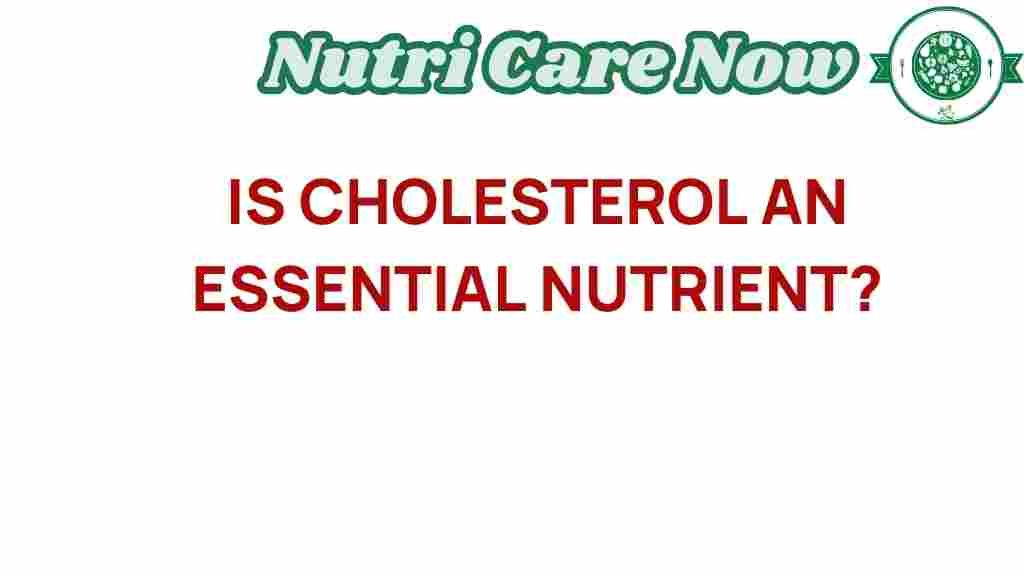Is Cholesterol an Essential Nutrient? Unpacking the Controversy
Cholesterol has long been a topic of heated debate in the realms of nutrition and health. Often vilified as a major contributor to heart disease, cholesterol is frequently misunderstood and misrepresented in discussions about dietary fats and overall wellness. In this article, we will explore the question: Is cholesterol an essential nutrient? We will examine health myths, the role of dietary fats, and the science behind cholesterol to help clarify these misconceptions.
Understanding Cholesterol
Cholesterol is a waxy substance found in every cell of the body. It plays several vital roles, including:
- Building cell membranes
- Producing hormones
- Forming bile acids that help digest fat
- Contributing to the synthesis of vitamin D
Cholesterol is transported through the bloodstream by lipoproteins, which are classified into two main categories: high-density lipoprotein (HDL) and low-density lipoprotein (LDL). While HDL is often referred to as “good” cholesterol, LDL is labeled as “bad” cholesterol. However, this classification can be overly simplistic.
The Essential Nutrient Debate
To determine whether cholesterol is an essential nutrient, we need to look at the definition of essential nutrients. Essential nutrients are substances that the body cannot synthesize on its own and must obtain from the diet. Interestingly, the body produces cholesterol naturally, primarily in the liver. This means that cholesterol is not classified as an essential nutrient in the traditional sense.
However, it’s crucial to understand that while cholesterol itself is not essential in the dietary sense, it is vital for many bodily functions. The body can adjust its production of cholesterol based on dietary intake. Therefore, consuming cholesterol-rich foods may not significantly impact total cholesterol levels for most healthy individuals.
Health Myths Surrounding Cholesterol
Many misconceptions about cholesterol persist, leading to confusion regarding its role in health and nutrition. Here are some common health myths:
- Myth 1: All cholesterol is bad.
- Myth 2: Dietary cholesterol significantly raises blood cholesterol levels.
- Myth 3: If you have high cholesterol, you must eliminate all saturated fats from your diet.
- Myth 4: Only older adults need to worry about cholesterol levels.
These myths can lead to unnecessary dietary restrictions and anxiety about heart health. Understanding the true nature of cholesterol is essential for making informed choices about nutrition.
Dietary Fats and Cholesterol
Dietary fats play a significant role in influencing cholesterol levels. Not all fats are created equal, and their impact on heart health varies:
- Saturated Fats: Found in animal products and some plant oils, saturated fats can raise LDL cholesterol levels. However, recent studies suggest that the relationship is more complex than previously thought.
- Trans Fats: These are artificial fats found in processed foods, and they are known to increase LDL cholesterol while lowering HDL cholesterol. Trans fats should be avoided for optimal heart health.
- Unsaturated Fats: These include monounsaturated and polyunsaturated fats, which can help improve cholesterol levels. Sources include olive oil, avocados, nuts, and fatty fish.
Incorporating healthy fats while limiting unhealthy ones is an important component of a balanced diet that promotes heart health and overall wellness.
The Role of Nutrition in Heart Health
Nutrition plays a crucial role in maintaining heart health. A well-balanced diet rich in whole foods can help manage cholesterol levels and reduce the risk of heart disease. Key components include:
- Fruits and Vegetables: These are high in fiber, vitamins, and antioxidants, which are beneficial for heart health.
- Whole Grains: Foods like brown rice, quinoa, and whole-wheat bread can help improve cholesterol levels.
- Lean Proteins: Sources such as fish, poultry, legumes, and nuts provide essential nutrients without excessive saturated fat.
- Healthy Fats: As mentioned earlier, incorporating sources of unsaturated fats can promote better cholesterol profiles.
For more information on heart-healthy diets, check out this resource from the American Heart Association.
Step-by-Step Process to Manage Cholesterol Levels
If you’re concerned about cholesterol and heart health, follow these steps to manage your levels effectively:
- Get Regular Check-Ups: Monitor your cholesterol levels through regular blood tests as recommended by your healthcare provider.
- Adopt a Heart-Healthy Diet: Focus on whole foods, healthy fats, and fiber-rich options.
- Stay Active: Engage in regular physical activity, aiming for at least 150 minutes of moderate exercise per week.
- Avoid Smoking: Quitting smoking can improve HDL cholesterol levels and benefit heart health.
- Limit Alcohol Intake: If you consume alcohol, do so in moderation.
By following these steps, you can significantly improve your cholesterol levels and overall heart health.
Troubleshooting Common Issues
While managing cholesterol levels can sometimes be straightforward, you may encounter challenges. Here are some troubleshooting tips:
- Difficulty with Dietary Changes: Start small by incorporating one or two heart-healthy meals each week, gradually increasing as you become comfortable.
- Plateaus in Weight Loss: If you’ve hit a plateau, consider consulting a nutritionist for personalized advice and meal planning.
- Inconsistent Exercise Routine: Find a workout buddy or join a fitness class to stay motivated and accountable.
- Feeling Overwhelmed by Information: Focus on one aspect of your lifestyle at a time; it’s okay to take gradual steps toward change.
Managing cholesterol and heart health is a lifelong journey, and it’s essential to be patient and persistent.
Conclusion: The Truth About Cholesterol
In conclusion, while cholesterol is not classified as an essential nutrient, it is undeniably critical for numerous bodily functions. The ongoing controversy surrounding cholesterol often stems from health myths and misconceptions about dietary fats and their effects on heart health. By understanding the role of cholesterol, debunking myths, and adopting a balanced diet rich in healthy fats and other nutrients, you can take proactive steps toward maintaining optimal heart health.
To enhance your wellness journey, continue to educate yourself about nutrition and consult with healthcare professionals as needed. Remember, informed choices lead to healthier lives.
For further insights, you might want to explore this NHLBI resource on cholesterol and heart health.
This article is in the category Health and created by NutriCareNow Team
